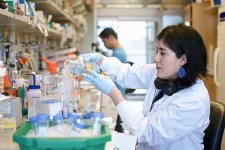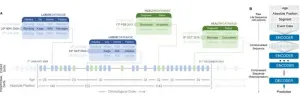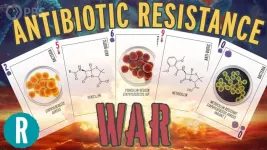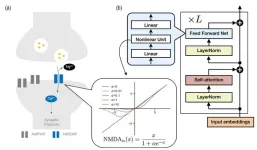(Press-News.org) ITHACA, N.Y. - A tiny, hard-working bacterium – which weighs one-trillionth of a gram – may soon have a large influence on processing rare earth elements in an eco-friendly way.
In a new study, Cornell University scientists show that genetically engineering this bacterium could improve the efficiency for the purification of elements found in smartphones, computers, electric cars and wind turbines, and could even boost global economic supply chains.
Vibrio natriegens, the bacterium, offers a sustainable method – called biosorption – to extract valuable and needed elements rather than use older, polluting solvent-heavy methods.
The Cornell research, “Multiple Rounds of In Vivo Random Mutagenesis and Selection in Vibrio Natriegens Result in Substantial Increases in REE Binding Capacity,” was published Dec. 6 in Synthetic Biology, an American Chemical Society journal.
“Traditional thermochemical methods for separating lanthanides are environmentally horrible,” said Buz Barstow, assistant professor of biological and environmental engineering at Cornell, the corresponding author. “It’s difficult to refine these elements. That’s why we send rare earth elements offshore – generally to China – to process them.”
Doctoral student Sean Medin and Anastacia Dressel led the research to genetically engineer a strain of Vibrio natriegens to increase its ability to biosorb – or extract – rare earth elements.
The researchers changed the genome of Vibrio natriegens with a plasmid called MP6, which introduces errors into the genome and then screened the mutants for increased biosorption of rare earth elements. “Given the ease of finding significant biosorption mutants, these results highlight just how many genes likely contribute to biosorption,” he said, “as well as the power of random mutagenesis in identifying genes of interest and optimizing a biological system for a task.”
Rare earth elements play a critical role in modern society. They are found in computers, batteries and clean energy technologies. In early 2021, the White House ordered an assessment that later found an over-reliance on the foreign sources and adversarial nations processing the elements, posing national and economic security.
Vibrio natriegens – and a growing array of bacterial tools – offer a way to safely bring rare earth elements and minerals processing back to the U.S. For example, at the Mountain Pass rare earth element mine in California, near the tip of the Nevada border, biological processing could bring this mine back to robust domestic productivity, Barstow said.
“This new work gives us a shot to leapfrog thermochemical methods,” Barstow said. “We can engineer this and other bacterium and because we don’t need to purify proteins, we can operate this kind of system much more cheaply than competing biological processes.”
The U.S. no longer has expertise in thermochemical processing methods, Barstow said. “For purifying rare earth elements, we’re now left with competing green methods” he said. “So even if we wanted to old thermochemical methods, we probably couldn't. We no longer know how to do it.”
Barstow said: “We are being forced to innovate our way out of this problem.”
This research was supported by Cornell Presidential Life Sciences Graduate Fellowship, the Cornell Energy Systems Institute, the Cornell Engineering Learning Initiative, the Burroughs Welcome Fund, an Academic Venture Fund award from the Cornell Atkinson Center for Sustainability, a Cornell 2030 Project Fast Grant, and a gift from Mary Fernando Conrad and Tony Conrad.
END
Little bacterium may make big impact on rare-earth processing
2023-12-18
ELSE PRESS RELEASES FROM THIS DATE:
AI generates proteins with exceptional binding strengths
2023-12-18
A new study Dec. 18 in Nature reports an AI-driven advance in biotechnology with implications for drug development, disease detection, and environmental monitoring. Scientists at the Institute for Protein Design at the University of Washington School of Medicine used software to create protein molecules that bind with exceptionally high affinity and specificity to a variety of challenging biomarkers, including human hormones. Notably, the scientists achieved the highest interaction strength ever reported between a computer-generated biomolecule and its target.
Senior author David Baker, professor of biochemistry at UW Medicine, ...
Artificial intelligence can predict events in people's lives
2023-12-18
Artificial intelligence developed to model written language can be utilized to predict events in people's lives. A research project from DTU, University of Copenhagen, ITU, and Northeastern University in the US shows that if you use large amounts of data about people's lives and train so-called 'transformer models', which (like ChatGPT) are used to process language, they can systematically organize the data and predict what will happen in a person's life and even estimate the time of death.
In a new scientific article, 'Using Sequences of Life-events to Predict Human Lives', published ...
Einstein receives $10.9 million grant to validate remote cognitive testing for Alzheimer’s and other dementias
2023-12-18
December 18, 2023—(BRONX NY)—Neurologists often diagnose Alzheimer’s disease after evaluating patients during lengthy, in-person office visits. This poses a significant challenge for many groups, particularly people with limited access to specialized care, including people from historically marginalized groups and people living in rural areas.
Albert Einstein College of Medicine has received a five-year, $10.9 million grant from the National Institutes of Health (NIH) to study whether remote neuropsychological testing can substitute for in-person office visits when assessing whether people have Alzheimer’s disease or other dementias.
“In-person ...
The antibiotic resistance war (video)
2023-12-18
WASHINGTON, Dec. 18, 2023 — There’s a microscopic battle happening right before our eyes, involving the critical issue of antibiotic resistance. Witness the historical development of antibiotics, from penicillin's accidental discovery to the ongoing battle against superbugs. https://www.youtube.com/watch?v=OCR5wFWSGlA
Reactions is a video series produced by the American Chemical Society and PBS Digital Studios. Subscribe to Reactions at http://bit.ly/ACSReactions and follow us on Twitter @ACSReactions.
The American Chemical Society (ACS) is ...
AI's memory-forming mechanism found to be strikingly similar to that of the brain
2023-12-18
An interdisciplinary team consisting of researchers from the Center for Cognition and Sociality and the Data Science Group within the Institute for Basic Science (IBS) revealed a striking similarity between the memory processing of artificial intelligence (AI) models and the hippocampus of the human brain. This new finding provides a novel perspective on memory consolidation, which is a process that transforms short-term memories into long-term ones, in AI systems.
In the race towards developing ...
15th annual horizon scan identifies 15 most pressing issues for conservation, including invertebrate decline and changing marine ecosystems
2023-12-18
Since 2009, the Cambridge Conservation Initiative has coordinated an annual horizon scan, a well-established method for predicting which threats, changes, and technologies will have the biggest impact on biological conservation in the following year. This year, the 15th horizon scan included 31 scientists, practitioners, and policymakers who developed a list of 96 issues, which they eventually narrowed down to the fifteen most novel and impactful. Their findings, publishing in the journal Trends in Evolution & Ecology ...
Toothbrushing tied to lower rates of pneumonia among hospitalized patients
2023-12-18
Toothbrushing also associated with lower rates of ICU mortality, shorter duration of mechanical ventilation, and shorter ICU length of stay
Researchers say toothbrushing could be a cheap but effective way to help lower rates of hospital-acquired pneumonia
Researchers have found an inexpensive tool that may help reduce rates of pneumonia for hospitalized patients—and it comes with bristles on one end. A new study by investigators from Brigham and Women’s Hospital, a founding member of the Mass General Brigham healthcare system, and Harvard Pilgrim Health Care Institute ...
Ecosystem benefits to humanity expected to decline by 9% by 2100
2023-12-18
As climate change redistributes terrestrial ecosystems across the globe, the world’s natural capital is expected to decrease, causing a 9% loss of ecosystem services by 2100. That’s according to a study of natural capital published today in the journal Nature led by scientists at the University of California, Davis, and Scripps Institution of Oceanography at UC San Diego.
Breathable air, clean water, healthy forests and biodiversity all contribute to people’s well-being in ways that ...
Public benefit programs and differential associations with child maltreatment by race and ethnicity
2023-12-18
About The Study: The results of this study raise concerns that benefit programs may add relative advantages for white children compared with Black and Hispanic children and contribute to racial and ethnic disparities in child protective services investigations. States’ eligibility criteria and distribution practices should be examined to promote equitable effects on adverse child outcomes.
Authors: Henry T. Puls, M.D., of Children’s Mercy Kansas City, is the corresponding author.
To access the embargoed study: Visit our For The Media website ...
Association between daily toothbrushing and hospital-acquired pneumonia
2023-12-18
About The Study: The findings of this systematic review and meta-analysis of 15 randomized clinical trials with an effective population size of 2,786 patients suggest that daily tooth brushing may be associated with significantly lower rates of hospital-acquired pneumonia, particularly in patients receiving mechanical ventilation, lower rates of intensive care unit (ICU) mortality, shorter duration of mechanical ventilation, and shorter ICU length of stay. Policies and programs encouraging more widespread and consistent toothbrushing ...






